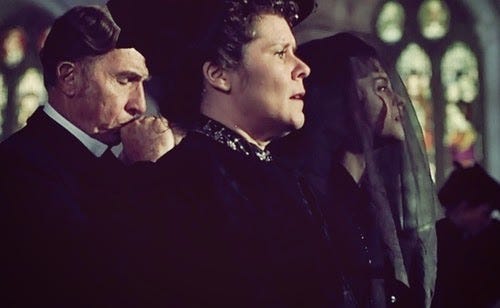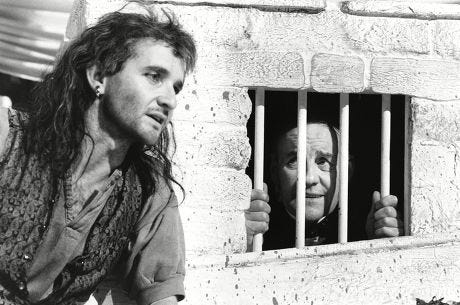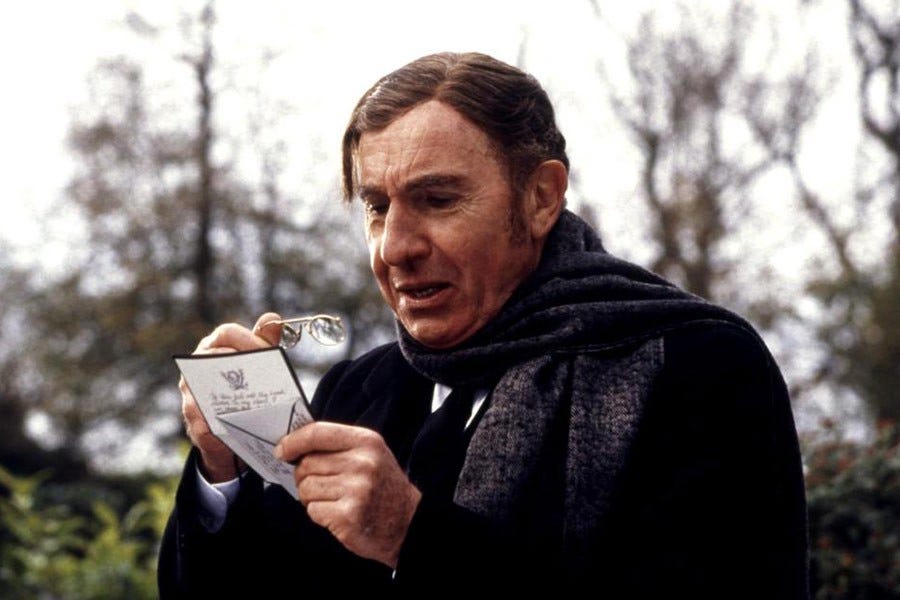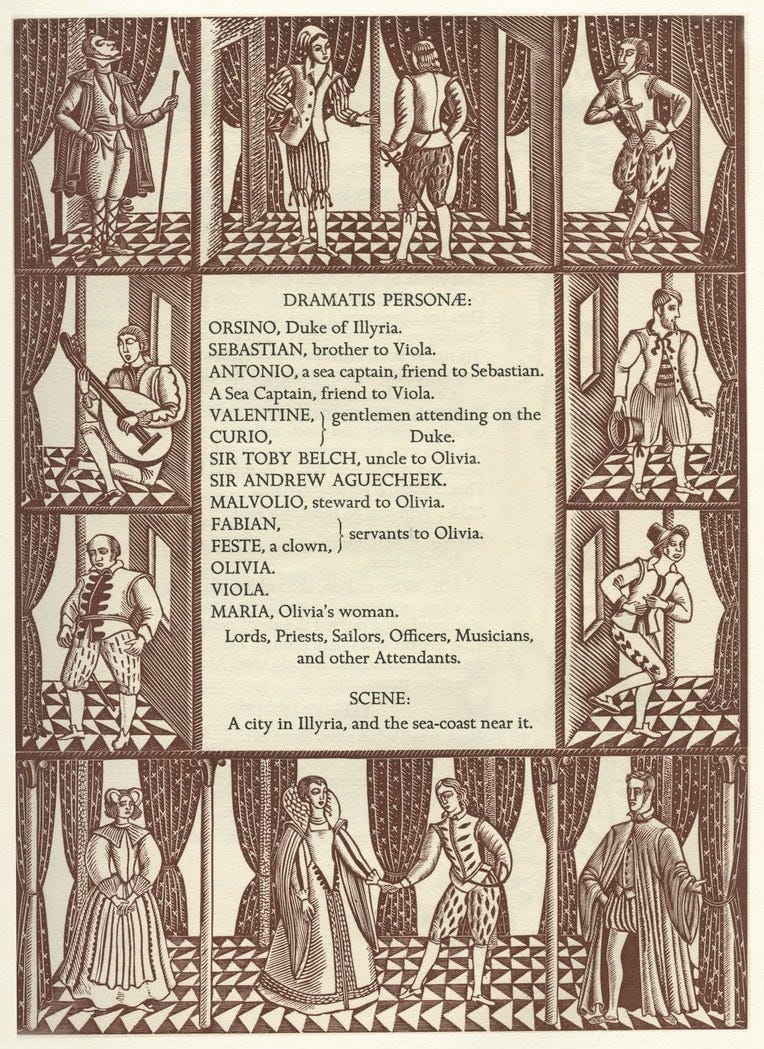Twelfth Night for Twelfth Night
Why Shakespeare's comedy is actually the perfect thing to watch at the start of the year
We are still in a cozy Christmas haze here eating too much lebkuchen, introducing our children to brainless fare like Peter Jackson’s Hobbit trilogy, and ending our evenings with hot buttered rum. It’s a time of happy, festive excess, and fittingly today’s post is about a play that is full of festive excess and which is named for the feast that marks the end of Christmastide: Epiphany or Twelfth Night.
Why Shakespeare chose to name his comedy, which contains no references to the Christmas season, after the feast that commemorates the visit of the Magi to the Christ Child is not always readily obvious to viewers. Some put it down to the play being first performed on Twelfth Night. Others point out that Renaissance Twelfth Night festivities were a time of topsy-turvy revelry before the sobriety of Lent, and that the society of the fictional island of Ilyria is imbued with this festive spirit.
One explanation for the comedy’s title that you see less often is simply that it’s a play that hinges on an epiphany which is suggestive of the cosmic implications of the Epiphany.
Twins, Viola and Sebastian, are separated in a shipwreck that washes each ashore on Ilyria, a dream-like place set apart from the workaday world. But the festive spirit on the island has become muddled and disordered. Revelry, which is fun for a time, becomes something that leaves one feeling bloated and in a stupor when it goes on for too long.
The Duke Orsino opens the play with the oft-quoted line: “If music be the food of love, play on”, but few people go on to quote the next few lines: “Give me excess of it, that, surfeiting, / The appetite may sicken, and so die.”
Orsino is in love with the Countess Olivia, though it is more accurate to say that he is in love with being in love. He is intoxicated with the feeling of love. Food, excess, appetite, sicken. He characterizes love as a hunger which may be overfed and sickened, and yet he feels a helpless victim to it: “My desires, like fell and cruel hounds, pursue me.”
The Countess Olivia, likewise, feels helpless to her own disordered love. Her brother has died and she has resolved to grieve him for seven years by shutting herself away from anyone’s sight outside of her household, wearing a veil, and weeping daily. She may do these things for a seemingly noble purpose, but the veil that obscures her face is a symbol of her obscured interior vision. She locks herself into her own world and commits herself to a life of barrenness by trying to “keep fresh” “a dead brother’s love”.
This play is so much about love. It is about the hierarchy of loves from the love of power to the love of drink all the way up to the love of spiritual, transcendent things. It is a play about how what you love, “or what you will” as the play is alternatively titled, shapes you. And it is as though the very air of Ilyria is noxious to right-thinking and right-doing causing the characters to act in a haze and feel chained to baser loves and misplaced ideals.

In the second scene of the play, we are introduced to Viola freshly washed ashore, and it is immediately apparent that she and Sebastian differ from those in Ilyria. Viola fears that Sebastian is dead, but though she is greatly grieved, she must think of how to fend for herself in this strange land and her immediate movement to disguise herself and obtain occupation in Orsino’s court contrasts to Olivia’s languor.
Sebastian is likewise characterized by definite and courageous action in distressing circumstances. The captain of the ship, a survivor alongside Viola, gives her hope that Sebastian may have also survived:
After our ship did split… I saw your brother, Most provident in peril, bind himself, Courage and hope both teaching him the practise, To a strong mast that lived upon the sea.
Sebastian poses a striking counter image to the languishing, self-pitying Orsino. Even in the churning waves, he binds himself to the ship’s mast in an action that calls to mind the image of Christ on the cross paradoxically triumphing over death even in death’s grip.
Viola, too resembles Christ in the way that she draws people out of their fogginess and brings them to life. Orsino has been passively and unsuccessfully wooing Olivia by sending messengers on his behalf. He employs Viola, now disguised as Cesario, to plead his case anew to the Countess.
Olivia tries to send Viola/Cesario away just as she has with Orsino’s other messengers, but Viola is resolute, and once she is presented with the veiled Olivia, she insists on seeing her face. She then upbraids Olivia for irrationally cloistering away her beauty: “Lady, you are the cruell’st she alive / If you will lead these graces to the grave / And leave the world no copy.”
Viola points out that Olivia’s hard-heartedness will only lead to sterility and death. In one of the most well-known speeches from the play, Viola, says how she would woo Olivia were she Orsino:
Make me a willow cabin at your gate, And call upon my soul within the house; Write loyal cantons of contemned love, And sing them loud even in the dead of night Hallow your name to the reverberate hills, And make the babbling gossip of the air Cry out "Olivia!" O, you should not rest Between the elements of air and earth But you should pity me.
Idealized romantic love in Shakespeare is so often an image of God’s love, and Viola’s speech is reminiscent of the unquenchable fire of divine love, of the “majestic instancy” of the hound of heaven. Olivia, awakened to something unlike the self-indulgent, passive love of Orsino, immediately lays aside her mourning and falls head over heels in love with this Cesario.
Orsino and Olivia are not the only inhabitants of Ilyria who are madly in pursuit of disordered desires. Sir Andrew Aguecheek and Sir Toby Belch, respectively suitor and uncle to Olivia, are, at all hours of day or night, in search of a good time. Their very names names bring to mind revelry that has become bloated and sickening.
Their nemesis is Malvolio, the puritanical steward of Olivia’s household who condemns all festivity. Of all the characters, Malvolio is most “sick of self-love”. He aspires and schemes to possess power one day by marrying Olivia, and in the meantime, he occupies himself with curtailing Toby and Andrew’s merrymaking.
Throughout the play the characters, as victims to their desires, make fools of themselves, and Malvolio, whose name means ill-will, is shown to be the most foolish of all. In an iconic scene, Sir Toby and his friends trick Malvolio into thinking Olivia is in love with him. They forge a letter from Olivia telling Malvolio that her one true desire is to see him dressed in yellow cross-garters and his face full of smiles. Malvolio, whose enormous ego blinds him to any common sense, falls easily prey to their designs and assumes this mad attire and behavior.
Olivia, believing Malvolio to be out of his mind, allows Sir Toby to lead him away to find help, and Toby, glad to be rid of his enemy, locks Malvolio in a dark cell. Though Toby’s action is a cruel one, this prison reflects the truth of Malvolio’s inner state.
The Fool who serves in Olivia’s court is one of the few characters aside from Viola who possesses a clear vision and, under his motley guise, is able to call out others on their failings and short-sightedness. Pretending to be the curate, Sir Topas, he visits Malvolio who cannot see him from within the cell. The Fool chases Malvolio round and round with ironic double speak that, while ridiculous on the surface, is actually suggestive of darker truths.
Malvolio: Sir Topas, never was man thus wronged. Good Sir Topas, do not think I am mad. They have laid me here in hideous darkness—
Fool: Fie, thou dishonest Satan! … Sayest thou that house is dark?
Malvolio: As hell, Sir Topas.
Fool: Why, it hath bay windows transparent as barricadoes, and clerestories toward the south-north are as lustrous as ebony; and yet though complainest thou of obstruction?
Malvolio: I am not mad, Sir Topas. I say to you this house is dark.
Fool: Madman, thou errest. I say there is no darkness but ignorance, in which thou art more puzzled than the Egyptians in their fog.
Malvolio: I say this house is dark as ignorance, though ignorance were as dark as hell. And I say there was never man thus abused. I am no more mad than you are.
The ‘madness’ bandied about here is not mental illness as we moderns view it: amoral and medically diagnosable. Rather, it is linked to darkness, ignorance, and hell. Like Olivia’s veil, this madness is a mirage overlaid on reality, making it impossible to see clearly. The windows of Malvolio’s soul are, in actuality, as “transparent as barricadoes” and “lustrous as ebony”.

Nearly all the characters contend with this moral darkness. Modern critics may sometimes interpret Olivia’s attraction for the disguised Viola as affirming culturally transgressive behavior, but it is clear that Viola fully understands how Olivia’s detachment from reality can only end badly. “What thriftless sighs shall poor Olivia breathe!” she exclaims upon realizing Olivia’s feelings. Later, when Olivia confronts Viola with her love, Viola tells her: “I am not what I am”, a line that diabolically inverts the words of the God of Exodus: “I Am that I Am.” Viola’s words reveal how a disguise worn on a occasion of festivity in the security of knowing the truth of one’s identity (as in the case of Renaissance Twelfth Night revelers), cannot be sustained forever without dark consequences.
Olivia’s response is significant: “I would you were as I would have you be.” Olivia would rather have a fiction than reality, and she does not know how real her words are when she giddily tells Cesario, “A fiend like thee might bear my soul to hell.”
All the comic action of the play rests on duplicity, on characters being not what they are, whether Viola acting the part of a man or Orsino resigning himself to a feeble husk of masculinity. And there is much hilarity in Olivia abruptly throwing aside her mourning for the sake of a woman dressed as a man or in Malvolio duped into swaggering about idiotically in yellow cross-gartered stockings. But things cannot continue at the same pitch. The dark current of self-deception threatens to ruin the characters.
What then will save them? It must of course be an unmasking, an epiphany. Only then will the characters be united with reality. Only then may their souls be borne to heaven rather than hell. And in order to move towards union, towards oneness, Shakespeare ironically uses a device of doubling, a truth-telling duplicity so to speak. He uses twins.
At the climax of the play, everyone stares on dumbfounded as Sebastian and Viola behold one another scarcely daring to believe that the sibling each feared dead is actually alive. It’s a scene that, when justice is done to it, always moves me to tears, because once the masks are off, truth is revealed and it is an abounding and radiant thing. It is the light by which we can rightly see all reality—the light that startles one’s singular and narrow inner vision. Truth means resurrection and reunion and life and love.
In another act of joyous doubling, of festive duplicity, Orsino happily pairs off with Viola, and Olivia gladly accepts being married to Sebastian. The futile loves of Olivia for the fictive Cesario and Orsino for the cold Olivia are supplanted by the multiplicity of joys in married love. Their transfigured festivity bears little resemblance to the carousing of Sir Toby or the sickly self-indulgence of Orsino or the selfish idealism of Olivia. It is a super-abundance without sickening, a bounty without bloatedness, a purity that is not barren.
Twelfth Night doesn’t end with this high moment of glory though, and the two events that follow can be a stumbling block to viewers.
First, Malvolio emerges from his dark prison in a state of confusion and resentment. Before stalking off the stage, he threatens the characters who made him the butt of their joke: “I’ll be revenged upon the pack of you!”
Secondly, the Fool ends the play with a song which might appear an odd choice, as the words are not joyful ones. Instead, he describes the hardship of making one’s way in this world:
...when I came to man’s estate, With hey, ho, the wind and the rain, ’Gainst knaves and thieves men shut their gate, For the rain it raineth every day. But when I came, alas, to wive, With hey, ho, the wind and the rain, By swaggering could I never thrive, For the rain it raineth every day...
It’s helpful to consider key aspects of the comedic genre in order to understand how Malvolio’s bitterness and the Fool’s melancholy song hang together hang together with the happiness of the other characters. In The Terrain of Comedy, Louise Cowan describes comedy as centering on a community in a fallen world working together towards the restoration of the paradisal image. Comedy traditionally culminates, as we have seen in Twelfth Night, with a wedding that calls to mind the wedding feast of the Lamb.
However, while comedy looks toward heaven, it is still situated in the time of man, and in the end it still falls on the characters to sojourn in this world striving against the “wind and the rain” that “raineth every day”, that is to say, against the battering temptations to descend back into the fog of baser pleasures.
And there are always those, as is the case with Malvolio, who are mired in self-deception, unable to see and therefore, unable to participate in the comic community of grace. To them, we can only, as Orsino exhorts, “pursue… and entreat…to a peace” in the knowledge that we will be all the richer for the multitude of penitents who enter the Kingdom of God.
Twelfth Night is marvelously appropriate viewing material for Twelfth Night. The twelfth and final day of Christmastide evokes both a beginning and a fullness of time. The year’s temporal time begins anew, while the splendor of cosmic time is felt on the feast of a God making himself known to the rulers of the earth.
Orsino speaks of the anticipated double wedding of the main characters when he says: “When…golden time convents, / A solemn combination shall be made / Of our dear souls.” But in the golden time of eternity, a solemn combination of our dear souls will be made with this King who desires to unite us to him.
In the meantime, in our own workaday world, we are making resolutions in an energy of newness and hope all the while knowing that the winds and rains of life will inevitably batter us throughout the year. When we can divest ourselves of our masks of self-deception, our “hidden bargains with sin” as Jacques Phillipe puts it, we are able to surface above the noxious air of baser pleasures into the pure air and the radiant light of truth.
In the future, I’ll consider turning on paid subscriptions. For now, if you’ve enjoyed this piece or any of my other writing, consider supporting my work here:
And as always, sharing, leaving a comment, or subscribing is much appreciated.









A marvelous interpretation! I like having the 1996 film on while I pack away Christmas ornaments ("Baedeker's Ilyria" never gets old). Your thoughts will inform my viewing--and I might be making some connections with Dante as I'm currently reading Purgatorio.
This will be our third year doing a Twelfth Night reading party on Sunday! We have the children babysat at one house, with babysitters paid lavishly for their labor among our many progeny, and the adults gather at another house for feasting and a read-through of the play. Most of our friends are in no way literary or dramatic (I'm only one of those!), but with Prosecco and silly hats we muddle along.